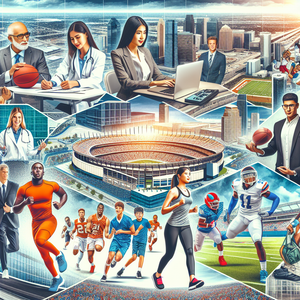The Hidden Heroes of Athletic Health

Primary care sports medicine physicians are uniquely trained to navigate the complexities of sports-related injuries and health issues. Unlike orthopedic surgeons, who focus primarily on surgical solutions, these physicians adopt a holistic approach that encompasses the physical and mental well-being of athletes. Their training includes not only the treatment of acute injuries but also the management of chronic conditions, rehabilitation, nutrition, and the psychological aspects of sports performance.
The Impact on Professional Athletes
At the professional level, the role of sports medicine physicians is indispensable. For instance, consider the rigorous demands placed on athletes in high-stakes environments such as the NFL or NBA. A sports medicine physician is often an integral part of the team, collaborating with coaches and trainers to ensure that players receive immediate care when injuries occur. They conduct pre-participation physical exams that are crucial for identifying potential health issues before they escalate into serious injuries.
Supporting Weekend Warriors and Everyday Athletes
While professional sports receive significant media coverage, primary care sports medicine physicians also cater to the needs of amateur athletes and recreational sports enthusiasts. Whether it’s a runner coping with shin splints or a weekend soccer player with a sprained ankle, these physicians provide essential services that enable individuals to stay active and healthy.
The Educational Component
Beyond treatment, primary care sports medicine physicians serve as educators. They empower athletes with knowledge about injury prevention, nutrition, and overall wellness. For example, Dr. Jennifer Davis, a sports medicine physician and educator, frequently conducts workshops on proper training techniques and nutrition for local high school athletes.
The contributions of primary care sports medicine physicians often go unnoticed, yet their impact on the world of athletics is profound. From aiding professional athletes in their recovery and performance to guiding everyday sports enthusiasts on their journey to health, these hidden heroes play a vital role in athletic health.
Primary Care Sports Medicine Physician
Professional sports teams, universities, sports medicine clinics, rehabilitation centers
Core Responsibilities
Diagnose and treat sports-related injuries, providing both immediate care and long-term management strategies.
Collaborate with athletic trainers and coaches to develop injury prevention programs and rehabilitation protocols.
Conduct comprehensive pre-participation physical exams for athletes at various levels.
Required Skills
Board certification in Family Medicine or Internal Medicine with a fellowship in Sports Medicine.
Strong interpersonal skills for effective communication with athletes, coaches, and other healthcare professionals.
Knowledge of nutrition, exercise physiology, and mental health as they relate to sports performance.
Athletic Trainer
Colleges and universities, high schools, professional sports teams, healthcare facilities
Core Responsibilities
Provide on-site injury assessment, treatment, and rehabilitation for athletes during practices and competitions.
Develop and implement injury prevention programs tailored to specific sports and athletes.
Maintain detailed medical records and communicate with healthcare providers about athlete injuries and progress.
Required Skills
Bachelor’s or Master’s degree in Athletic Training, with certification from the Board of Certification (BOC).
Proficiency in emergency response techniques and knowledge of various sports injuries.
Strong observational and problem-solving skills to respond quickly to injuries.
Sports Nutritionist
Sports teams, fitness centers, wellness clinics, private practice
Core Responsibilities
Develop customized nutrition plans to optimize athletic performance and recovery.
Educate athletes on the importance of diet and hydration in relation to their training and competition schedules.
Conduct body composition assessments and monitor dietary habits to ensure nutritional goals are met.
Required Skills
Registered Dietitian Nutritionist (RDN) credential and specialization in sports nutrition.
Understanding of the unique nutritional needs of athletes in different sports and disciplines.
Excellent communication skills to effectively convey dietary strategies to athletes.
Exercise Physiologist
Rehabilitation centers, sports performance facilities, research institutions
Core Responsibilities
Conduct fitness assessments to analyze athletes' cardiovascular and muscular fitness levels.
Design and implement exercise programs that enhance performance, recovery, and rehabilitation.
Monitor athletes' progress and adjust training regimens based on performance metrics.
Required Skills
Bachelor’s or Master’s degree in Exercise Physiology or a related field, with relevant certification (e.g., ACSM).
Knowledge of biomechanics, anatomy, and kinesiology.
Ability to use fitness assessment tools and data analysis software effectively.
Sports Psychologist
Sports organizations, colleges and universities, private practice, mental health clinics
Core Responsibilities
Provide mental skills training to athletes to enhance focus, motivation, and performance under pressure.
Conduct psychological assessments and develop individual strategies to address mental health issues in athletes.
Collaborate with coaches and sports medicine teams to create a supportive environment for athlete development.
Required Skills
Doctorate in Psychology or a related field with a specialization in sports psychology.
Strong understanding of the psychological demands of competitive sports and mental health issues.
Excellent communication and counseling skills to effectively support athletes.


